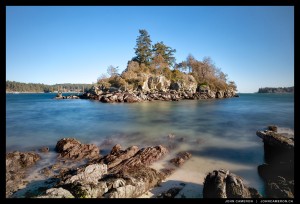The Province of British Columbia is close to brokering a deal to protect Grace Islet – a tiny private island currently at the center of a storm surrounding a First Nations aboriginal title claim.
Just over a month after insisting that there were no plans to work with the government to find a solution to the First Nation aboriginal title claim on the hotly-contested Grace Islet, it seems that the Province of British Columbia is moving ever-closer to purchasing the private island in order to protect and preserve it for future generations.
However, recent reports from Canadian daily The Globe and Mail now suggest that the deal to protect the island could be finalized as soon as February 2015. If successful, the entirety of Grace Islet will be transformed into a nature conservancy under the joint management of the Province, The Nature Conservancy and the First Nations group who triggered the debate surrounding the future of Grace Islet.
As Private Island News reported on 9th December 2014, Steve Thomson, the British Columbian Minister for Forests, Lands and Natural Resources, confirmed last month that he was seeking Treasury Board approval to give the province the option to purchase the island from its current owner, Edmonton resident Barry Skawsky.
Despite being registered as an archaeological site as far back as 1966, Grace Islet was zoned as residential land and sold to Mr. Skawsky back in 1990 – a decision which “adversely interfered and interferes with the exercise of aboriginal title to Grace Islet,” according to a spokesperson for the Cowichan Tribe, the First Nations group contesting Mr. Skawsky’s ownership claim.
An independent architectural impact assessment was carried out on the island in the mid-90s proving the existence of as many as sixteen ancient burial cairns and countless human skeletal remains – a particularly relevant point given that under British Columbia’s Heritage Conservation Act, it is illegal to “damage, desecrate or alter a burial place.”
Despite this, however, the Crown proceeded to grant Mr. Skawsky with a so-called “site alteration permit” to build a sprawling retirement cottage. And despite this permit stipulating that construction work may not interfere with the island’s cairns, First Nation representatives allege that building has taken place directly atop at least two of the historical burial sites.
Whilst the construction of this sprawling cottage was brought to a halt on December 17th 2014 as a direct result of Minister Thompson’s application to the Treasury Board, First Nation representatives allege the intervention has come too late – the construction work has long-since gotten under way and the concrete foundation and the walls are already in place.
Despite this, Chief William Seymour of the Cowichan tribe is understandably delighted at the latest developments regarding the island. “I have been smiling ear-to-ear,” he said. “It is such a good feeling, we now have a chance to restore the burial grounds to as close as we can to before the machines were brought on.”
Whilst the final decisions about the management and access rights of the island are yet to be finalized, the region’s various First Nations tribes are all said to be in agreement with a proposal decision to hand over the Grace Islet’s titles to The Nature Conservancy.
The deal to secure the island’s future is expected to be in the millions, but could yet cost the Province a whole lot more, warns George Nicholas, a professor of archeology and director of Simon Fraser University’s Intellectual Property Issues in Cultural Heritage project. “Even if the Grace Islet problem is resolved – and I hope it is – it doesn’t ensure these issues do not emerge elsewhere,” he said. “You have to resolve the issues of how ancestral burial grounds are protected, or not, under the law in British Columbia.”
B.C-based lawyer John Alexander agreed, warning of a dire need to modernize the province’s heritage laws in order to avoid a risk to investment in the region. Explaining that aboriginal land claims are usually limited to Crown land, Alexander warned that the case of Grace Island could potentially have significant implications for other B.C. landowners.
“If these issues relate to this little piece of land [Grace Island], they would apply to dozens of sites just in the Gulf Islands. It could create a firestorm around commercial investment,” he added. “What would motivate a company like Petronas to spend billions of dollars on land if it could ultimately find a claim advanced against it?”
Private Island News will continue to monitor the situation with interest.



